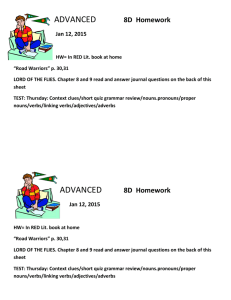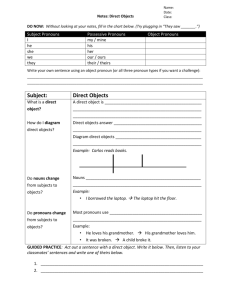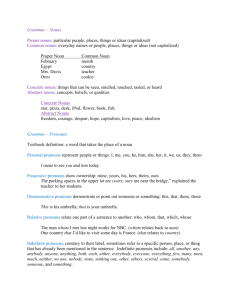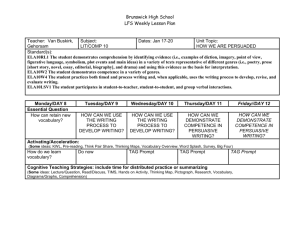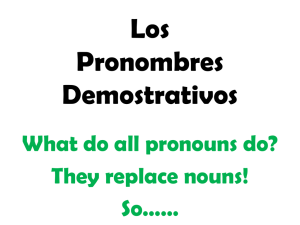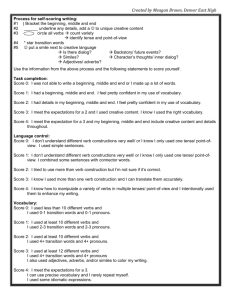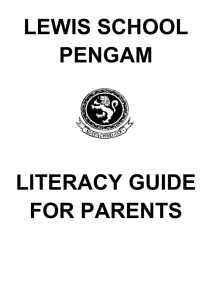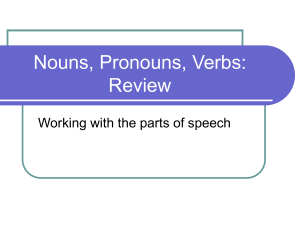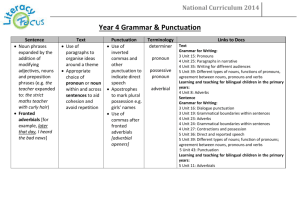Nouns
advertisement
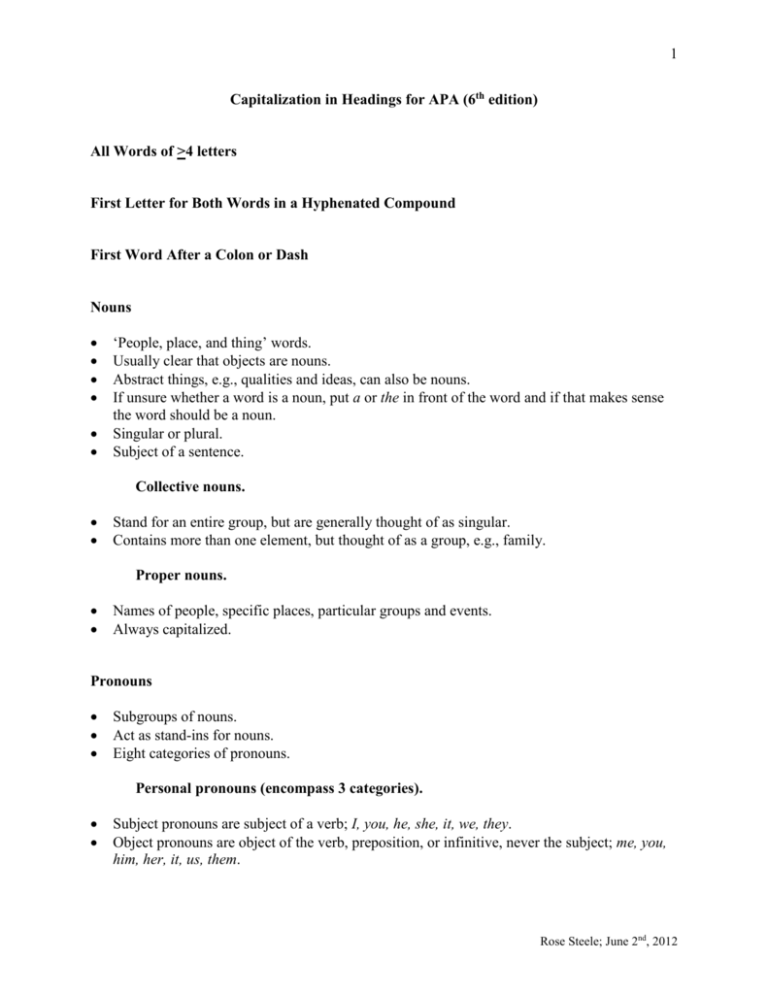
1 Capitalization in Headings for APA (6th edition) All Words of >4 letters First Letter for Both Words in a Hyphenated Compound First Word After a Colon or Dash Nouns ‘People, place, and thing’ words. Usually clear that objects are nouns. Abstract things, e.g., qualities and ideas, can also be nouns. If unsure whether a word is a noun, put a or the in front of the word and if that makes sense the word should be a noun. Singular or plural. Subject of a sentence. Collective nouns. Stand for an entire group, but are generally thought of as singular. Contains more than one element, but thought of as a group, e.g., family. Proper nouns. Names of people, specific places, particular groups and events. Always capitalized. Pronouns Subgroups of nouns. Act as stand-ins for nouns. Eight categories of pronouns. Personal pronouns (encompass 3 categories). Subject pronouns are subject of a verb; I, you, he, she, it, we, they. Object pronouns are object of the verb, preposition, or infinitive, never the subject; me, you, him, her, it, us, them. Rose Steele; June 2nd, 2012 2 Ownership pronouns show possession, answering the question “Whose?”; my, mine, your, yours, his, her, hers, its, our, ours, their, theirs. Note that personal pronouns are often fewer than 4 letters; may be useful to pay specific attention to this category because many other words fit into the ‘>4 letters rule’. Mirror pronouns. Reflect verb’s action back at subject; myself, yourself, himself, herself, ourselves, yourselves, themselves, itself. Relative pronouns. Link a subordinate clause to main clause in a sentence; which, that, who, whom, what, whatever, whomever. Question pronouns. Interrogative, used to ask questions; which, who, whom, what. Pointing (demonstrative) pronouns. Indicate which things you are talking about; that, these, this, those. Indefinite pronouns. Vague, don’t stand in for specific nouns; all, both, everybody, many, none, several, any, each, everything, more, nothing, some, anybody, either, few, much, one, someone, anything, enough, less, neither, plenty. Adjectives Descriptive words. Describe or modify nouns, e.g., the brilliant student; the shy girl. Verbs Express action or state-of-being. Verbs that express action, e.g., touching, are called action verbs. Verbs that express state-of-being, e.g., am, are called linking verbs. Verb tells what the subject is doing or what is being done to the subject, even if the subject is doing nothing more than just existing. Sometimes verb is more than a single word and includes the word ‘to’, e.g., to capitalize Can’t have a sentence without a verb. Rose Steele; June 2nd, 2012 3 Adverbs Modify verbs (e.g., run quickly), adjectives (e.g., often happy), or other adverbs (e.g., too quickly). Often end in -ly, but not always. If unsure whether a word is an adverb, think about function. Adverbs tend to tell where, when, or how. Prepositions (capitalize only if >4 letters) Express relationships between other words, nouns usually, including relationships of time or space. Examples of prepositions include: in, on, of, to, by, at, as, up, for, with, from, beyond, past, over, under, through, across, between, among, like, after, until, before. If unsure whether a word is a preposition, place it before ‘the fence’ and if makes sense then it should be a preposition (‘the fence’ is the object of the preposition). Conjunctions (capitalize only if >4 letters) Connect words or parts of sentences. Coordinating: connect equal parts of sentences; and, but, for, nor, so, yet. Correlative: also connect equal parts together, but really two conjunctions in one; both-and, either-or, neither-nor, not only-but also. Subordinating: linking, connect dependent or subordinate clauses with the independent or main clause; after, because, except that, in case, when, as, before, ever since, just as, whenever, as if, but that, if, since, while, as long as, even if, if only, until. Rose Steele; June 2nd, 2012
